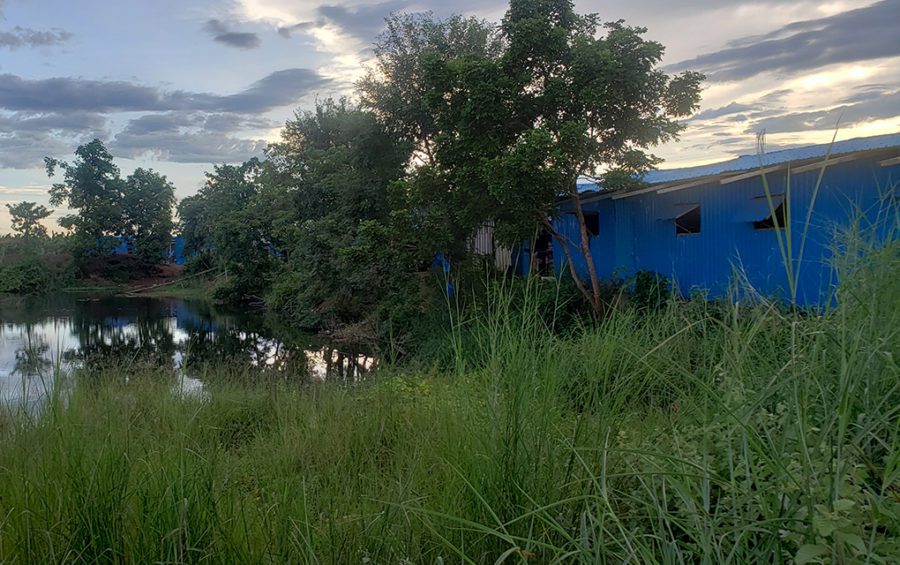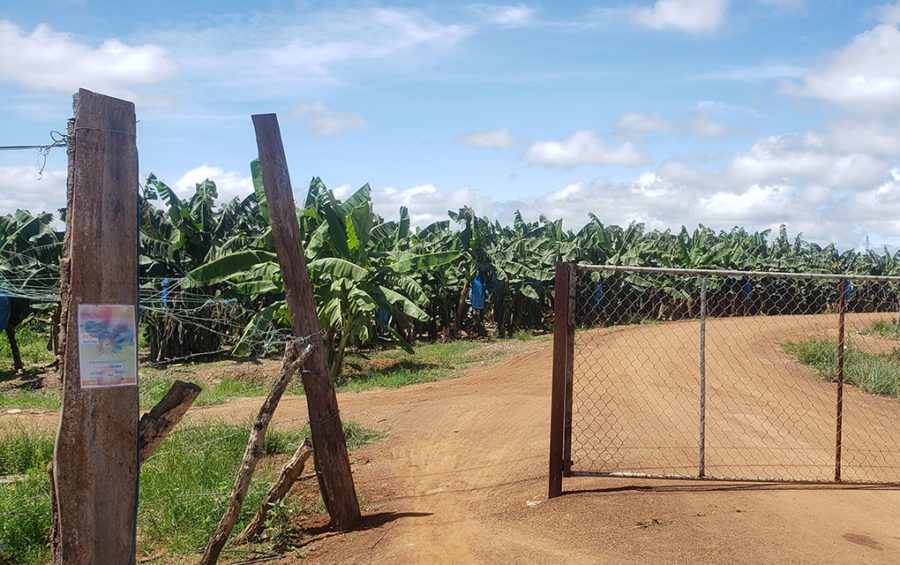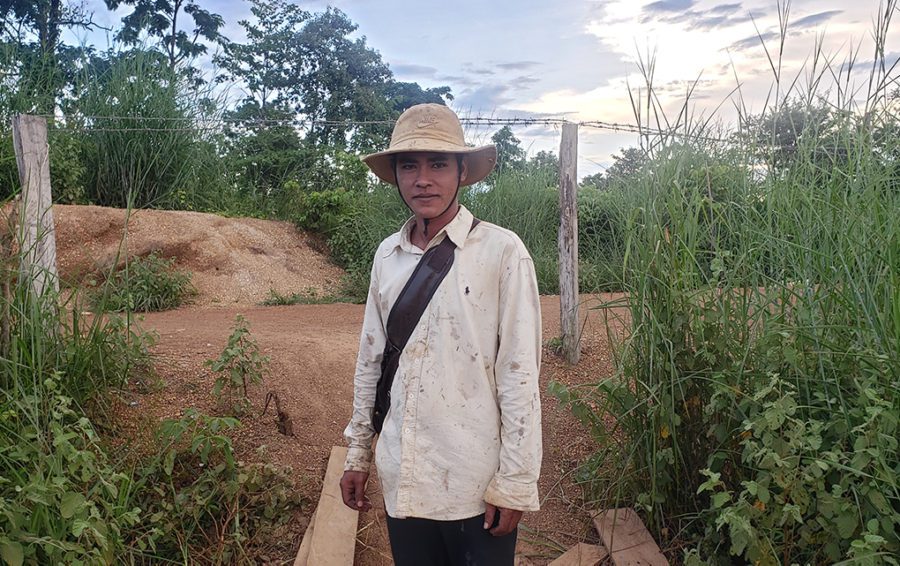THALA BARIVAT DISTRICT, Stung Treng province — As their children danced and roughhoused in front of thousands of banana trees, the workers who pick and pack the long yellow bananas for export, lounging after their shift, said they were just recovering from fevers and stomach issues.
Before the Pchum Ben holidays last month, Vong Suth, an assistant to one of the managers at the Stung Treng plantation TBYB Angkor Banana, said three to four workers per day were failing to report for their 7 a.m. shifts in his unit.
At its peak, dozens of workers living inside the plantation were failing to report for work, and he said some were spending their low wages to travel off the campus and visit a pharmacy for medicine — a hefty expense when they would not be earning their 25,000-riel (about $6.25) wage for that day.
Phat Samith, a former tomato farmer from Kratie province who now works inside the plantation, also had a fever this month, but his symptoms subsided by late September. Though the assistant suggested workers were not eating well, Samith was convinced that the cause of the recent sickness was agricultural chemicals, which workers said they are not able to clean off their skin with the pond water from near their shack homes. The worker, a 36-year-old father of two whose sons live with him on the plantation, said two drones fly overhead daily to spray chemicals on the banana trees, and workers receive no warning when the drones will pass their section of the plantation.
“Oh, that mixed fertilizer is poisoning [us] very badly,” said Samith. “Just the spreading vapors cause our throats to be dry and bitter.”
Migrant workers living inside the plantation TBYB Angkor Banana said people were getting sick in droves since moving onto the plantation, where there is no health care and families have little choice but to buy overpriced groceries from the company store. They blame chemicals, cramped living quarters and a lack of clean water for the illnesses, though the company denied any issues with the harsh lifestyle of workers who prepare Cambodian bananas for foreign supermarkets.

Unsanitary Living Conditions
At the end of a day tending trees, pruning leaves and packaging bananas, Van Meakh, a 30-year-old worker from Kratie province, sits on the unsturdy wooden platform outside his home in the cooling dusk air. The 2.5 square meter room, which he shares with his pregnant wife and daughter, is stuffy and claustrophobic. The company provided the accommodations but neglected details like mosquito nets. Each family is allocated one room in a long row of the blue sheet metal-sided building, with about enough space to throw down a mat for a small family to sleep close together. But as a migrant worker earning just 25,000 per day, this is the only available option, he said.
With high prices inside the company’s store, the wage is barely enough to feed one person, he told VOD.
Meakh too believed that the chemicals he and others spray on the trees was the main cause of the feverish symptoms spreading among workers, and that it was challenging for the workers to check on their health when there was no doctor within the plantation grounds. He also had a fever, but he had no money to buy medicine and no access to health care under the state-provided National Social Security Fund, so he waited for his symptoms to subside.
“It’s caused members of each family to get sick,” he said. “Here, no one [among the company managers] has contributed medicine or anything else to the sick workers. Working for a long time, we still have no money even just for going to see a doctor.”
Sometimes workers can take their motorbikes to buy food from outside the plantation, but even buying petrol from the company’s stores is more expensive, Meakh said.
Some try to fish from a nearby pond to save expenses, he added. In between paydays, workers can also buy goods on loan, but the company store raises the price on those items, he said.
Our skin is sticky when using that water to bathe. We have no choice.
For the workers living inside Angkor Banana’s sheet-metal housing units scattered on the plantation, agricultural chemicals are just one health issue.
Suth, the manager’s assistant, said he is from O’Svay commune and therefore doesn’t live on the plantation, but suspected that the living conditions within the housing units had contributed to the sickness passed around the workers in his section of the plantation.
In addition to the small rooms and expensive food, Suth said the workers get little water from a well dug by the company, forcing them to buy drinking water and use a manmade pond edged by the shack houses for bathing and cleaning.
Samith, the former tomato farmer, said the water they had was not clean.
“Our skin is sticky when using that water to bathe. We have no choice,” he said.
O’Svay commune chief Sek Mao estimated that only about 200 of the workers are from the area, so the rest of about 1,000 workers migrate from other provinces and live inside the plantation in different sections of housing.
Mao told VOD that he was concerned about the conditions he saw on a late September visit to the plantation, and he intended to raise the issues to the company when he could. The workers’ cooking space is close to their bathrooms, and the area smells bad as a result, he said.
“I saw a group of about 50 workers sick in a group. They got flu-like symptoms, and I’m concerned it’s [because of] unhygienic conditions,” he said.
Mao said that he would try to speak to Angkor Banana officials, but claimed he did not have any jurisdiction over the company’s conduct because that was decided at the provincial level.
“If coronavirus were to affect any one of the workers, it would spread to others very fast,” he said.
Stung Treng provincial hall spokesperson Men Kong denied that there were any issues at the plantation, though he said there had not been any inspections by the health and environmental departments.
“There have been no inspections on that case [health issues due to chemical fertilizers] so far because the company follows its plans and there are no signs or evidence that show the spray is seriously harmful to workers at the plant or people living nearby,” he said.
Provincial labor chief Bou Virun did not respond to multiple requests for comment.
Feeding International Demand
Converted from a rubber plantation, and then oil palm, Angkor Banana is one of the plantations tapping into a nationwide push for more agricultural exports amid the global economic crisis and new agriculture-focused free trade agreements. In the first six months of the year, Cambodia exported $68 million of bananas, already surpassing the $59 million of bananas exported in all of last year, according to Agence Kampuchea Presse.
Su Meth, a manager at the O’Svay plantation, said the company exports as much as 1,700 tons of bananas each month to China, Singapore and Japan, as well as growing some cashew and jackfruit.
To grow all those bananas, Meth said, the company uses an organic chemical, made by the Angkor Banana company, that “enriches the soil” and another chemical that preserves the green color of the trees’ leaves. He claimed that all the products were safe for workers.
As for the health woes, he blamed the workers for their illnesses, saying the company provided them shelter, well water and electricity.
“I often go to urge them [to clean] but as we know Cambodians, they are difficult,” he said. “Even though they stay at the company, shelter or collective home, they don’t clean. I go to check around their living place twice some days and see they are lacking in sanitation. The company orders them to clean their place once every weekend, but it doesn’t work.”
Ngan Rachana, chief of Stung Treng province’s National Social Security Fund office, said about 200 workers from Angkor Banana had applied for the health care scheme, but only about 70 were approved because the others did not have Cambodian identification cards.

Earlier this year, about 300 Angkor Banana workers requested intervention from the provincial labor hall, raising concerns about their low pay and poor relations with plantation management.
The workers, who don’t have a union, were frustrated with the frequency they got paid for their daily wages, said Suth, the assistant. It was once a month or every 10 days, depending on the manager, and subject to change. The protest dissipated when the company paid out outstanding wages, he said.
But conditions remain harsh for the migrant workers living inside Angkor Banana’s property, Suth said.
“[The workers] are very poor,” he said. “They have no money, but they need it very much, so they’re getting too many problems when the wage comes late.”
To worker Samith, he sees little choice but to accept the spraying of chemicals and bad water because his family needs the salary.
“If we dare to complain, they won’t stop,” he said. “We could leave if we don’t want to work. But then, what do we have to eat?”
Note: This report was produced with support from the Rosa Luxemburg Foundation under the financial support of the German Federal Ministry for Economic Cooperation and Development.














